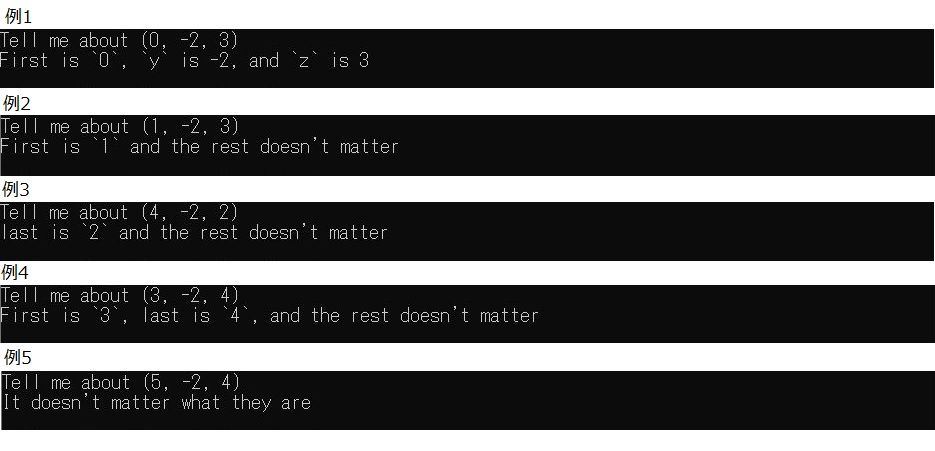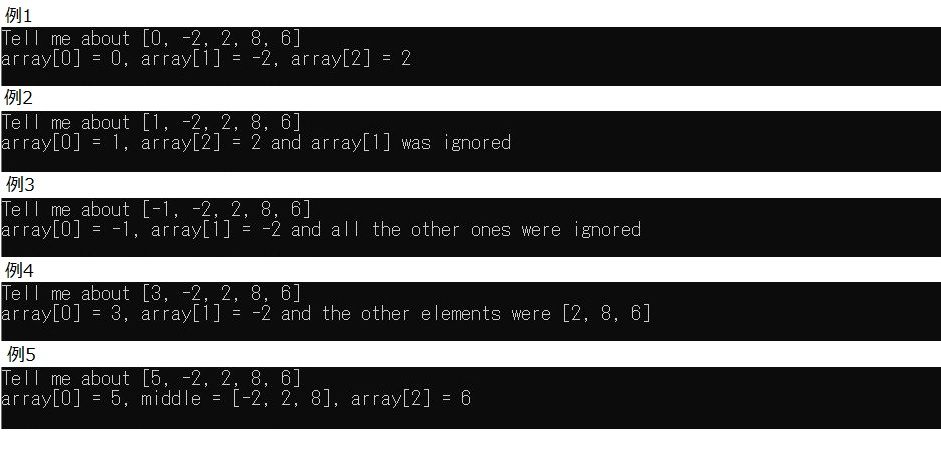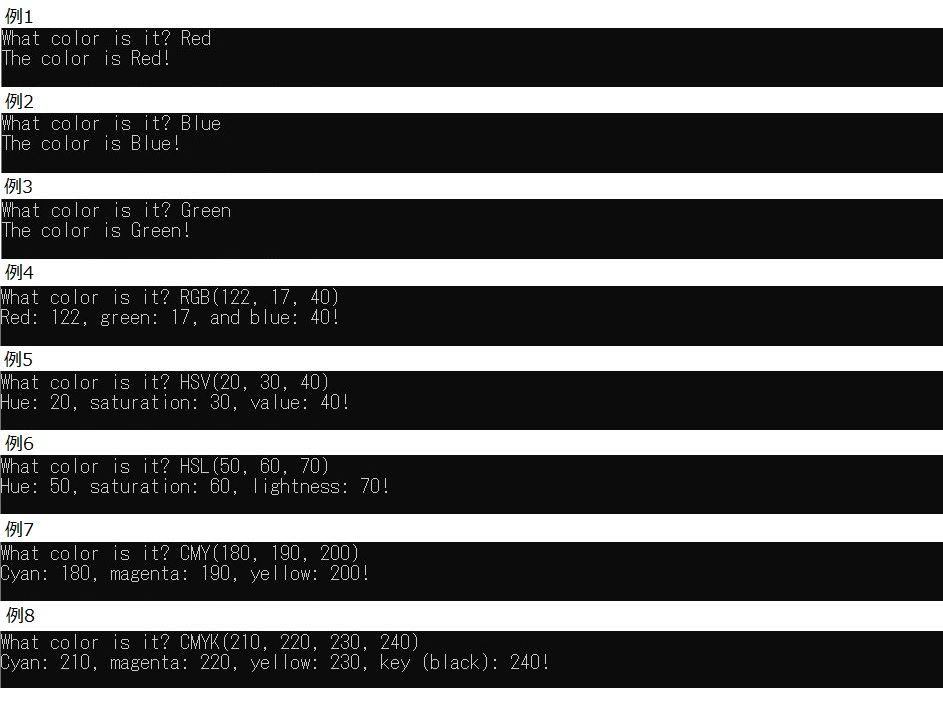
はだか祭の準備も進んでいるようだなと思う柴犬です。
概要
ここ数日、RUST を勉強しています。
この中で、改めて match 関数の重要性・利便性を認識しましたので、RUSTの次のホームページ(Rust by Example)を読み直しました。
Rust by Example
8. Flow of Control
8.5. match
8.5.1. Destructuring
https://doc.rust-lang.org/rust-by-example/flow_control/match/destructuring.html読む過程で、その中にある例を全部実行してみました。
match 関数の例が手際よくまとめているので、今後、役立つようにと思い投稿することにしました。
tuple
実行したコード
fn main() {
// 例1
let triple = (0, -2, 3);
// 例2 let triple = (1, -2, 3);
// 例3 let triple = (4, -2, 2);
// 例4 let triple = (3, -2, 4);
// 例5 let triple = (5, -2, 3);
println!("Tell me about {:?}", triple);
match triple {
(0, y, z) => println!("First is `0`, `y` is {:?}, and `z` is {:?}", y, z),
(1, ..) => println!("First is `1` and the rest doesn't matter"),
(.., 2) => println!("last is `2` and the rest doesn't matter"),
(3, .., 4) => println!("First is `3`, last is `4`, and the rest doesn't matter"),
_ => println!("It doesn't matter what they are"),
}
}実行の結果を例毎に示しています。

arrays/slices
実行したコード
fn main() {
// 例1
let array = [0, -2, 2, 8, 6];
// 例2 let array = [1, -2, 2, 8, 6];
// 例3 let array = [-1, -2, 2, 8, 6];
// 例4 let array = [3, -2, 2, 8, 6];
// 例5 let array = [5, -2, 2, 8, 6];
println!("Tell me about {:?}", array);
match array {
[0, second, third, ..] =>
println!("array[0] = 0, array[1] = {}, array[2] = {}", second, third),
[1, _, third, ..] => println!(
"array[0] = 1, array[2] = {} and array[1] was ignored",
third
),
[-1, second, ..] => println!(
"array[0] = -1, array[1] = {} and all the other ones were ignored",
second
),
[3, second, tail @ ..] => println!(
"array[0] = 3, array[1] = {} and the other elements were {:?}",
second, tail
),
[first, middle @ .., last] => println!(
"array[0] = {}, middle = {:?}, array[2] = {}",
first, middle, last
),
}
}実行の結果を例毎に示しています。

enum
実行したコード
#[derive(Debug)]
#[allow(dead_code)]
enum Color {
Red,
Blue,
Green,
RGB(u32, u32, u32),
HSV(u32, u32, u32),
HSL(u32, u32, u32),
CMY(u32, u32, u32),
CMYK(u32, u32, u32, u32),
}
fn main() {
//例1
let color = Color::Red;
//例2 let color = Color::Blue;
//例3 let color = Color::Green;
//例4 let color = Color::RGB(122, 17, 40);
//例5 let color = Color::HSV(20, 30, 40);
//例6 let color = Color::HSL(50, 60, 70);
//例7 let color = Color::CMY(180, 190, 200);
//例8 let color = Color::CMYK(210, 220, 230, 240);
println!("What color is it? {:?}", color);
match color {
Color::Red => println!("The color is Red!"),
Color::Blue => println!("The color is Blue!"),
Color::Green => println!("The color is Green!"),
Color::RGB(r, g, b) =>
println!("Red: {}, green: {}, and blue: {}!", r, g, b),
Color::HSV(h, s, v) =>
println!("Hue: {}, saturation: {}, value: {}!", h, s, v),
Color::HSL(h, s, l) =>
println!("Hue: {}, saturation: {}, lightness: {}!", h, s, l),
Color::CMY(c, m, y) =>
println!("Cyan: {}, magenta: {}, yellow: {}!", c, m, y),
Color::CMYK(c, m, y, k) =>
println!("Cyan: {}, magenta: {}, yellow: {}, key (black): {}!",
c, m, y, k),
}
}実行の結果を例毎に示しています。

pointers/ref
実行したコード
fn main() {
let reference = &4;
match reference {
&val => println!("Got a value via destructuring: {:?}", val),
}
match *reference {
val => println!("Got a value via dereferencing: {:?}", val),
}
let value = 5;
let mut mut_value = 6;
match value {
ref r => println!("Got a reference to a value: {:?}", r),
}
match mut_value {
ref mut m => {
*m += 10;
println!("We added 10. `mut_value`: {:?}", m);
},
}
}実行の結果を示しています。

structs
実行したコード
#[derive(Debug)]
struct Foo {
// タプル
x: (u32, u32),
// 符号無し整数
y: u32,
}
fn main() {
//例1
let foo = Foo { x: (1, 2), y: 3 };
//例2 let foo = Foo { x: (2, 2), y: 2 };
//例3 let foo = Foo { x: (3, 2), y: 3 };
println!("{:?}", foo);
match foo {
Foo { x: (1, b), y } => println!("First of x is 1, b = {}, y = {} ", b, y),
Foo { y: 2, x: i } => println!("y is 2, i = {:?}", i),
Foo { y, .. } => println!("y = {}, we don't care about x", y),
}
}実行の結果を例毎に示しています。
